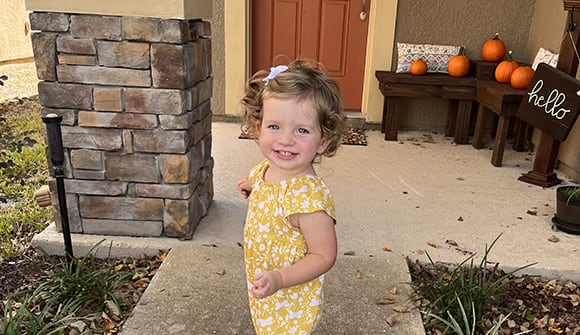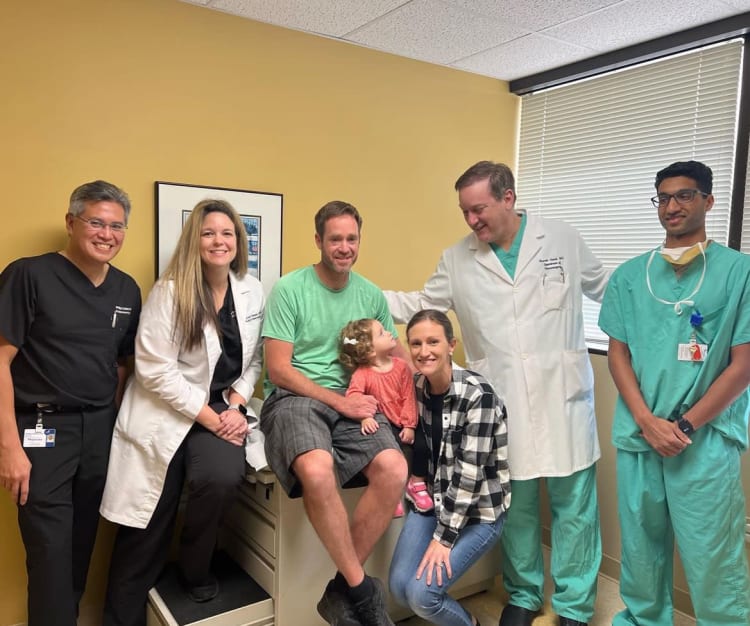Toddler’s stroke triumph
Dual expertise saves little girl.
Article Author: Melissa Seguin
Article Date:

On a regular Thursday in September 2022, Brooke Holstein took her three children, including her 15-month-old daughter Caroline, to the neighborhood pool. Up until this point, Caroline had been a healthy and cheerful little girl, but her mother quickly started noticing things weren’t quite right.
“She wasn't using her right arm normally and she was having some odd symptoms,” Holstein remembered. “She was snacking on Goldfish® by the pool, but she wouldn't use her right hand to grab them. She was falling over to her right side and her personality was also off. Instead of being her usual silly self, she seemed flat.”
Caroline’s parents quickly took her to their pediatrician and then later to the Wolfson Children’s Hospital Emergency Center in downtown Jacksonville.
A CT scan of Caroline’s brain showed areas of concern, so she was admitted to the hospital's Neuroscience Unit for further testing. Luckily, Wolfson Children’s is a designated pediatric stroke center and was prepared to provide the best care. Wolfson Children’s is also consistently named among the U.S. News & World Report 50 Best Children’s Hospitals for Neurology & Neurosurgery.
A brain MRI revealed that Caroline had a complex giant aneurysm, which is a bulge on the wall of a blood vessel resembling a balloon. In this case, the tot had multiple “balloons” and a blood clot had broken off from inside one of them, causing a stroke.
“We discussed a few options for treatment with the family, given the complexity of Caroline’s aneurysm,” said Ricardo Hanel, MD, PhD, an endovascular neurosurgeon and co-medical director of Baptist Health's Stroke and Cerebrovascular Center. “While a craniotomy – during which we remove a portion of the skull to access the brain – is more invasive, we determined it would be a lower-risk operation for her case.”
Two experts, one toddler
To give her brain time to heal from the stroke before surgery, Caroline was sent home while Dr. Hanel and Philipp Aldana, MD, a pediatric neurosurgeon and co-medical director of the Walter and Michelle Stys Neuroscience Institute at Wolfson Children’s Hospital, developed a plan to treat Caroline’s aneurysm. Dr. Hanel, who specializes in treating aneurysms, performed the surgery and Dr. Aldana joined as a pediatric neurosurgery expert and advocate for Caroline’s case.
“Our pediatric cerebrovascular team provides expertise in the treatment of children, and the adult neurovascular team brings their expertise as aneurysms are more common in adults,” said Dr. Aldana. “Together, we can provide the best of both worlds for these kids as both teams are fully centered on what's best for our patients.”
In November 2022, two months after her first symptoms, 17-month-old Caroline and her family returned to Wolfson Children’s Hospital for her big surgery.
“We inserted multiple clips, similar in shape to clothespins, that go at the base of the dome of the aneurysm. When you deploy the clip, it cuts off blood supply to the aneurysm, which will eventually deflate,” Dr. Aldana explained. “For Caroline’s surgery, we had to use 8-10 clips to remodel the vessel."
Resilient recovery

Caroline Holstein and her parents pose with Dr. Aldana (left), Dr. Hanel (second from right) and other care team members at a follow-up appointment.
Six days after her surgery, following a stay in the Neuro-Intensive Care Unit, Caroline was discharged and back to her normal self.
At her follow-up appointment six months later, Dr. Hanel and Dr. Aldana were amazed at her recovery. Caroline's brain had rerouted around the diseased area of the vessel, completely shutting off blood flow in that area and minimizing the risk of another stroke.
“Small kids often can't tell us that their head hurts, so when it comes to stroke or aneurysms, parents should look for nausea and vomiting or their child passing out for no reason,” said Dr. Hanel. “Migraines are a very common problem in kids, but I always tell parents to push for further testing such as an MRI to rule out anything more severe as the cause.”
Now, over a year after her stroke, Caroline is a sweet, silly and energetic 2-year-old. She enjoys playing with her older brothers and has no limitations from her stroke or her aneurysm.
Caroline will continue to visit her doctors at Wolfson Children’s to monitor her brain with regular scans, but she’s not at any additional risk for stroke or aneurysm.
“We’re thankful that we live so close to Wolfson Children’s and that we had such a wonderful, compassionate and knowledgeable medical team to take care of Caroline,” said Holstein.
A stroke is a life-threatening emergency. If you or someone you know is experiencing symptoms, call 911 immediately. For more information about the Stys Neuroscience Institute at Wolfson Children’s Hospital, visit wolfsonchildrens.com/neuro. To learn more about the services Baptist Health offers for strokes, brain aneurysms and other cerebrovascular conditions, visit baptistjax.com/stroke.



